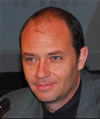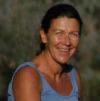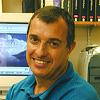Principal investigator (PI) |
Esteban G. JobbágyUniversidad de Buenos Aires, Facultad de Agronomia - Universidad Nacional de San Luis, IMASL-GEAjobbagy@unsl.edu.ar 
Esteban Jobbágy is an Agronomist (Universidad de Buenos Aires) and Ph.D in Biology (Duke University). His research focuses on the effects of land use/land cover change on biogeochemical and hydrological cycles. Approaches involve field experiments and observations, use of stable isotopes and other environmental tracers, remote sensing, and synthesis of regional, continental, and global data. He is currently a professor in the School of Agronomy of Universidad de Buenos Aires and a CONICET researcher at Universidad Nacional de San Luis, where he has recently founded the GEA lab (grupo de estudios ambientales), focused on the link between biogeochemical cycles, hydrology and land use change.
|
Authorized Institutional Representative (AIR) |
Roberto FernandezUniversidad de Buenos Aires, Facultad de Agronomíafernandez@ifeva.edu.ar 
Roberto´s background is on Agricultural Sciences and Natural Resources (B.A. and MSc, Universidad de Buenos Aires - UBA) and Botany/Ecology (PhD, Duke University). His main line of research focuses on the effects of water stress on whole plants, assessing possible tradeoffs between maximum growth and drought tolerance, and aiming to understand the eco-physiological basis of such tolerance. These studies ask whether the coordination between plastic adjustments of different types that take place during ontogeny (involving changest in morphology, anatomy and physiology) allows to classify species and genotypes into distinct syndromes of resistance to stress. His work with graduate and undergraduate students involves the use of controlled environments, simulation modeling, and field experiments in the Patagonian and Monte deserts. He is a member of "AridNet for the Americas", an NSF-funded project to analyze desertification and other types of resource degradation in arid areas from the perspective of both the biophysical and socio-economic perspectives. Roberto is currently a professor at Facultad de Agronomía, UBA, and a researcher at IFEVA, a joint UBA-CONICET institute.
As the AIR of the proyect, Roberto monitores the perfomance provisions of the CRN II Grant Agreement of the funds provided, and to assure that the activities will be carried out in accordance with the provisions of the Grant Agreement.
|
Co-Principal investigators (Co-PI) |
Alice AltesorFacultad de Ciencias, Universidad de la República, Uruguayaaltesor@fcien.edu.uy 
Alice Altesor is a Biologist, Magister Scienteae (Universidad Nacional Autónoma de México) and Ph.D in Ecology (Universidad Nacional Autónoma de México). Her research focuses on grassland ecology particularly on the response of the vegetation to grazing: from the individual traits to ecosystem functioning. She is currently a professor and member of PEDECIBA at Facultad de Ciencias de la Universidad de la República.
|
Genaro CoronelFacultad de Ciencias Exactas y Naturales (FaCEN)-Universidad Nacional de Asuncióngcoronel@sce.cnc.una.py He is a Master of Science (Physics) P.R University-USA, is currently a Professor in Physics Department and Researcher at LIAPA de la Facultad de Ciencias Exactas y Naturales de la Universidad Nacional de Asunción. Is a Co-PI in the project PROSUR CRN 055(IAI), a Collaborative Research Network to promote research into the causes of climate variability in the Mercosur region of South America. SGP II - 057; T rends in the Hydrologic Cycle of the Plata Basin : Raising Awareness and New Tools for Water Management. LIAPA Lab., focused in measurements UV-B, Surface Ozone. LIAPA Lab., work with climate and environmental problem.
|
Heitor L. CoutinhoEmbrapa Solosheitor@cnps.embrapa.br
Heito Coutinho is a BSc Agronomist (Federal Rural University of Brazil Rio de Janeiro, 1990), PhD Biological Sciences (University of Bristol, UK, 1993), is a researcher at Embrapa since 1994.
His main research interests are soil ecology ( understanding te interactions between soil biotic (biodiversity and biological activity) and abiotic factors (chemical, physical, and hydrologic properties), and their relations with nutrients, carbon, and water cycling) , and environmental impacts monitoring (land use changes and their impacts on the environmental services provided by natural and agricultural ecosystems, with a focus on erosion control and regulation of carbon and water dynamics in the soil). On-going projects include: Land use change in the R/io de La Plata /basin: Linking biophysical and human factors to understand trends, assess impacts, and support viable strategies for the future. (IAI, CRN II) (CoPI); Rio de Janeiro Sustainable Integrated Ecosystem Management In Production Landscapes of the North-Northwestern Fluminense (GEF/World Bank) (coordinator of soil monitoring activities); Formoso River: Integrated Watershed Management and Protection (GEF/World Bank) (participatory land use p lanning and monitoring activities).
|
Carlos M. DibellaINTA - Instituto de Clima y Aguacdibella@cnia.inta.gov.ar 
Carlos M. Di Bella is Agronomist and obtained a PhD degree at INA P-G (France). He is researcher at the Institute of Climate and Water (ICyA-INTA) and CONICET (National Research Council). Coordinator of the Remote Sensing and GIS Area at ICyA, his research focuses on the application and development of remote sensing and GIS techniques to natural resources management and monitoring.
|
Howard E. EpsteinDepartment of Environmental Sciences - University of Virginiahee2b@virginia.edu 
Howard Epstein received his M.S. in rangeland ecosystem science and Ph.D. in ecology from Colorado State University. His research focuses on vegetation dynamics and plant-soil-climate interactions across various ecosystem types, including water-limited grasslands, shrublands, and savannas; and temperature-limited arctic tundra. He uses various approaches in his research, such as field observations and experiments, remote sensing and simulation modeling. He is currently an Associate Professor in the Department of Environmental Sciences at the University of Virginia.
|
William A. HoffmannDepartment of Botany - North Carolina State Universitywilliam_hoffmann@ncsu.edu 
William Hoffmann received his M.S. and Ph.D. from the Department of Organismic and Evolutionary Biology at Harvard University. He subsequently held postdoctoral research positions in Land-Atmosphere Modeling at the University of Texas and in Plant Ecophysiology at the University of Brasilia. After four years as a visiting professor in the Forestry Department at the University of Brasilia, he is now Assistant Professor in the Department of Plant Biology at North Carolina State University. His current research includes physiological controls of vegetation-climate interactions and the ecology and dynamics of tropical savanna-forest transitions.
|
Robert B. JacksonDepartment of Biology - Duke Universityjackson@duke.edu 
Research Interests: Physiological and ecosystem ecology; biogeochemistry. Robert B. Jackson examines feedbacks between global change and the biosphere. Current projects in his lab include studies of the global carbon and water cycles,biosphere/atmosphere interactions, and global change. He is currently Director of Duke's Center on Global Change, the Duke University Program in Ecology, and Duke's Stable Isotope Mass Spectrometry Laboratory. In his quest for solutions to global warming, he also directs the new Department of Energy-funded National Institute for Climate Change Research for the southeastern U.S. and co-directs the Climate Change Policy Partnership, working with energy and utility corporations to find practical strategies to combat climate change.
|
Juan Carlos Maceira,Secretaría de Agricultura, Ganadería, Pesca y Alimentación (SAGPyA)jmacei@sagpya.minproduccion.gov.ar |
Elke NoellemeyerFacultad de Agronomía, Universidad Nacional de La Pampanoellemeyer@agro.unlpam.edu.ar 
Elke Noellemeyer is an Agronomist (University of Saskatchewan) and works currently as Professor for Soil Science at the Facultad de Agronomía of Universidad Nacional de La Pampa. Her research is concerned with the effects of land use on biogeochemical cycles and soil quality. She conducts studies in the semiarid region of central Argentina comparing agricultural, mixed livestock and cash crop, as well as ranching systems and different managements of agro ecosystems. Recently she also collaborated in human dimension studies of the impact of land use and global change.
|
Martín OesterheldIFEVA, Facultad de Agronomía, Universidad de Buenos Airesoesterheld@ifeva.edu.ar 
Martín Oesterheld is an Agronomist (Universidad de Buenos Aires) and Ph.D in Biology (Syracuse University). His research focuses on the temporal and spatial patterns of variation of primary production and the effects of grazing and other disturbances on grasslands and savannas. Approaches involve field experiments and, remote sensing, and synthesis of regional, continental, and global data. He is currently a professor in the School of Agronomy ofUniversidad de Buenos Aires and a CONICET researcher.
|
Daniel PanarioFacultad de Ciencias, Universidad de la República, Uruguaypanari@fcien.edu.uy 
Daniel Panario is an Agronomic Engineer (Universidad de la República Uruguay). His research focuses on the effects of land use change on physical and biogeochemical cycles. Approaches involve field experiments and observations, use of remote sensing and other environmental signals over soils, beaches and sediments involving global trends in climate change during present and Holocene period. He is currently a professor on the Faculty of Science (Universidad de la República), coordinator of the Environmental Science Master Program and Director of a research team in de Faculty of Sciences.
|
Jose M. ParueloIFEVA, Facultad de Agronomía, Universidad de Buenos Airesparuelo@ifeva.edu.ar 
José Paruelo is an Agronomist and Magister Scienteae (Universidad de Buenos Aires) and Ph.D in Rangeland Ecosystem Scence (Colorado State University). His research focuses on grassland ecology and on the effects of land use/land cover change on ecosystem functioning. Approaches involve field experiments and observations, simulation modelling, remote sensing, and synthesis of regional, continental, and global data. He is currently a professor in the Facultad de Agronomía of the Universidad de Buenos Aires (FAUBA) (Argentina) and a member of the scientific staff of CONICET. He is also invited Professor and member of PEDECIBA in the Facultad de Ciencias of the Universidad de la República (Uruguay). José is the director of the Laboratorio de Análisis Regional y Teledetección (LART) of FAUBA.
|
Maggie MeirellesEmbrapa Solos - Universidad Estadual do Rio de Janeiromargaret@cnps.embrapa.br 
Soil Engineering (1986) with Master degree in System Engineering applied to Computer Graphics and Digital Image Processing at Rio de Janeiro Federal University (COPPE/UFRJ - 1993) and Ph.D. on Geomatics - GIS Modeling for Environmental Planning from the same University together with ITC "International Institute for Geo-information Science and Earth Observation, Holland (1997). Nowadays: Lecturer at Rio de Janeiro State University" Post-Graduate Course on Geomatics since 2000): GIS, Spatial Analyses, Hydrological Modeling and Geomatics. Coordinator of Informatics - Engineering Faculty of Rio de Janeiro State University Geomatics Management at Embrapa Solos -National Soil Research Center of Brazilian Agricultural Research Corporation.
|
Diego E. PiñeiroFacultad de Agronomía - Universidad de la República, Uruguaydiego@fcs.edu.uy |
Guillermo P. PodestáRosenstiel School of Marine an Atmospheric Science - University of Miamigpodesta@rsmas.miami.edu 
Originally trained in Agronomy, Guillermo Podestá has become involved in studies of interannual climate variability associated with El Niño-Southern Oscillation phenomenon, and of applications of seasonal-to-interannual climate predictions to enhance decision-making in climate-sensitive sectors of society such as agriculture. His interests also include satellite remote sensing of ocean dynamics using sea surface temperature, ocean color, and sea surface height fields; applications of satellite and in situ observations to the understanding of oceanic variability and biological responses. He has previously written on fishery oceanography and fishery ecology. Guillermo is Research Professor of Meteorology and Physical Oceanography at the Rosenstiel School of Marine and Atmospheric Science of the University of Miami. |
Tomas SchlichterINTA EEA Barilochepforestc@bariloche.inta.gov.ar |
Ernesto F. ViglizzoINTA - Centro Regional La Pampa-San Luiseviglizzo@anguil.inta.gov.ar 
Agronomist (La Pampa University, Argentina), MSc. (University of Mar del Plata, Argentina) and Ph.D (Catholic University of Louvain, Belgium). Main research field: ecology of agricultural systems. Investigations are focused on the effect of land-use and technology change on the functionality of agro-ecosystems at various spatial and temporal scales. E.F. Viglizzo coordinates the National Program on Environmental Management in INTA (National Institute of Agricultural Technology, Argentina), is a CONICET (National Research Council of Argentina) researcher, and teaches at the Faculty of Natural Sciences in La Pampa University and the University of Mar del Plata, Argentina, both in graduate and post-graduate courses. He has participated as member of the scientific staff and Lead-Author of global programs like those of IPCC, Millennium Ecosystem Assessment and IAASTD (International Assessment for Agricultural Science and Technology Development). He has coordinated (1998-2003) a scientific cooperation program on agricultural sustainability for PROCISUR, which involved six countries in the Southern Cone of South America.
|